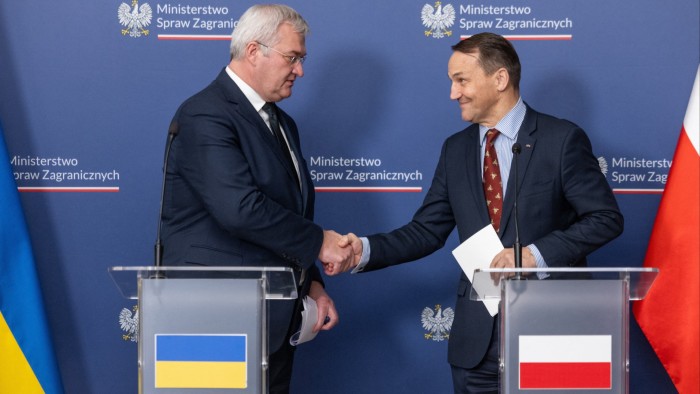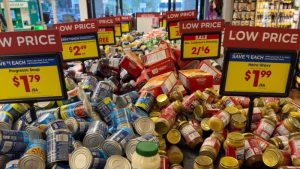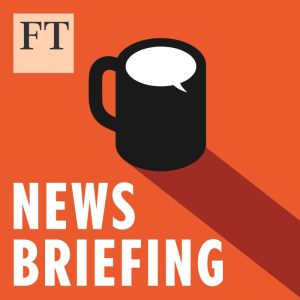Why Europe is strapping in for the long haul with support to Kyiv

This article is an on-site version of our Europe Express newsletter. Premium subscribers can sign up here to get the newsletter delivered every weekday and Saturday morning. Standard subscribers can upgrade to Premium here, or explore all FT newsletters
Good morning. After months of interminable political bickering that achieved the sum total of zero changes to her original line-up, the European parliament is set to approve Ursula von der Leyen’s second cohort of commissioners today, and finally let the EU executive get back to work. Here’s all you need to know.
Today, I parse the changing attitude around EU capitals towards supporting Ukraine three weeks on from the US election. And our trade correspondent unpacks the first Brussels-born report on “resetting” the EU-UK relationship.
Long haul
If European responses to Donald Trump’s election victory began with denial and anger, they have by now settled into acceptance — at least when it comes to support for Ukraine.
Context: Trump, who will retake control of the world’s biggest economic and military power on January 20, has vowed to bring immediate peace to Ukraine and cut support to Kyiv. The US is currently the biggest single provider of military aid as it battles Russia’s more than 1,000-day invasion.
Since Russia launched its full-scale war, European capitals have vowed to support Ukraine for “as long as it takes.”
That previously came with the caveat that Uncle Sam was picking up roughly half the tab. From January, that’s in serious doubt, meaning European capitals are now assessing how much extra cash could be found, and how quickly.
“More money for Ukraine seems inevitable,” wrote Eurasia Group’s Mujtaba Rahman in a recent note. “The EU’s moment of truth is fast approaching.”
At the same time, support mechanisms are being overhauled to make them more long-term and sustainable. Initial support involved shipping weapons to Kyiv as quickly as possible; now EU governments are investing in Ukrainian arms factories.
Outgoing European commissioner Didier Reynders said yesterday that of the next €1.9bn tranche of earnings from Russian assets immobilised in the EU, €1bn would go to Ukraine’s defence industry, rather than being used to buy western arms.
“We have indeed gradually moved from the one-off solutions at the outset of the invasion to [a] more systemic assistance mechanism,” Reynders told the European parliament.
The biggest question, of Ukraine’s long-term security, is yet to be answered. If the US does not provide security guarantees to the postwar state, many European capitals will be nervous about doing so without America standing behind them.
But most realise some risk will be required, given that if Ukraine falls, Europe is next.
“It’s dawned on all of us that frankly whatever the US decides to do, Ukraine is always going to be our neighbour,” said one senior European official.
Chart du jour: Global warning
The deal on climate financing agreed at COP29 is too little, too late. This global problem requires a global solution, writes Martin Wolf.
Across the barricades
After dozens of reports by British think-tanks on how to “reset” relations with the EU since Brexit, finally Brussels’ own Bruegel has weighed in, writes Andy Bounds.
Context: London policy wonks have long opined on how to improve on the thin post-Brexit trade deal signed in 2020, which has damaged the UK economy and curtailed job opportunities for its citizens. But EU member states are broadly happy with it; while remaining open to closer ties.
Now Ignacio García Bercero, a former senior European Commission trade official, has weighed into the debate with a three-point plan for the reset.
Bercero told the FT that London needed to move fast while the EU has time to listen. By next summer it will have its hands full dealing with incoming US President Donald Trump’s probable tariffs, bolstering support to Ukraine and the more transactional revision of the Trade and Cooperation Agreement with the UK.
In June 2026 TCA provisions on EU access to British fishing waters and mutual co-operation on energy expire, requiring intense talks.
Bercero favours a focused deal that would be relatively quick to negotiate, featuring three legally-binding agreements.
First, a veterinary deal whereby the UK committed to EU standards, allowing for food and drink to move seamlessly between the two.
Second, an agreement to link emissions trading systems, which would prevent UK exporters paying carbon taxes from 2026.
Third, a youth mobility deal. The EU wants under-30s to be able to work or study for up to four years but the UK has rejected the idea as a return to free movement of labour. Bercero suggests EU states loosen visa rules for travelling performers, a key UK demand, in return.
He also advocates a new regulatory co-operation framework and regular ministerial forum. The Spaniard will debate his ideas at Chatham House in London next week.
What to watch today
-
Leaders of the Nordic and Baltic countries and Poland meet in Sweden for talks.
-
European commission president Ursula von der Leyen and European parliament president Roberta Metsola hold a joint press conference following the vote on the new college of commissioners.
Now read these
Recommended newsletters for you
Trade Secrets — A must-read on the changing face of international trade and globalisation. Sign up here
Swamp Notes — Expert insight on the intersection of money and power in US politics. Sign up here
Are you enjoying Europe Express? Sign up here to have it delivered straight to your inbox every workday at 7am CET and on Saturdays at noon CET. Do tell us what you think, we love to hear from you: [email protected]. Keep up with the latest European stories @FT Europe
#Europe #strapping #long #haul #support #Kyiv






